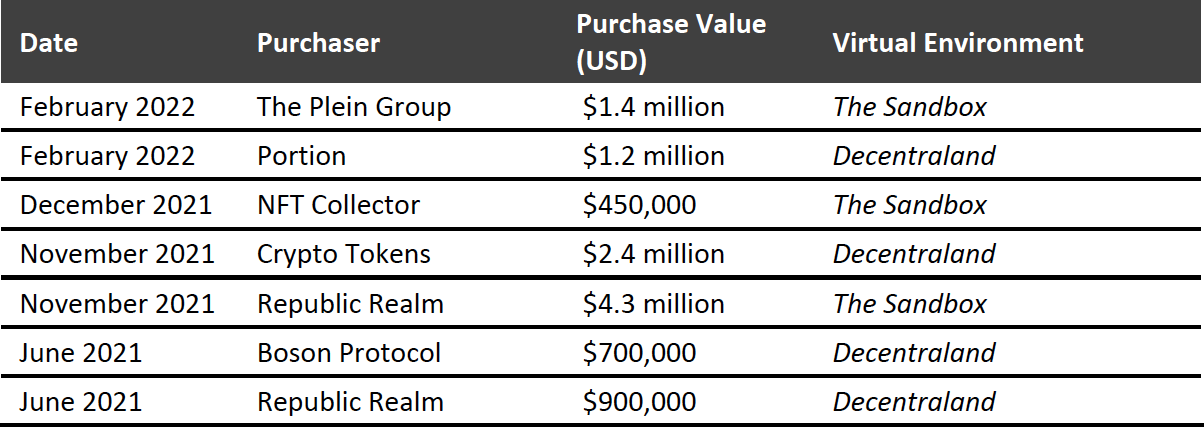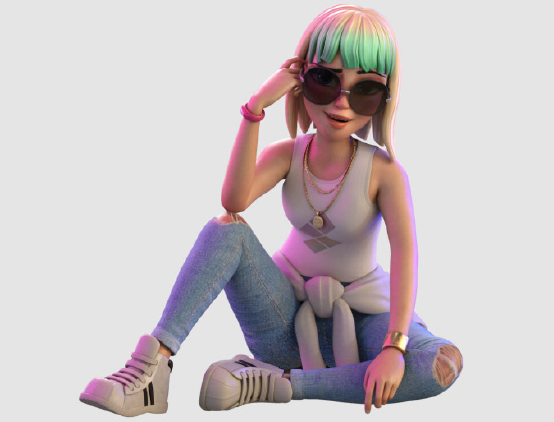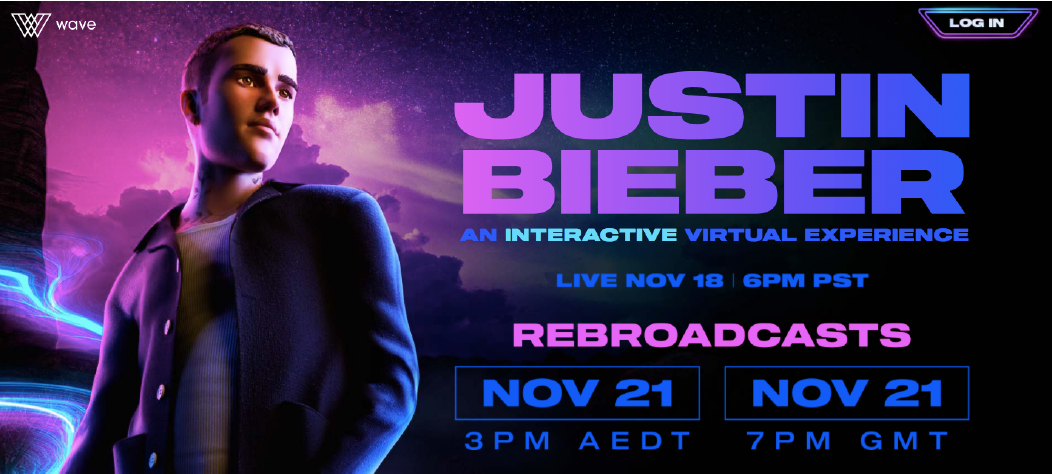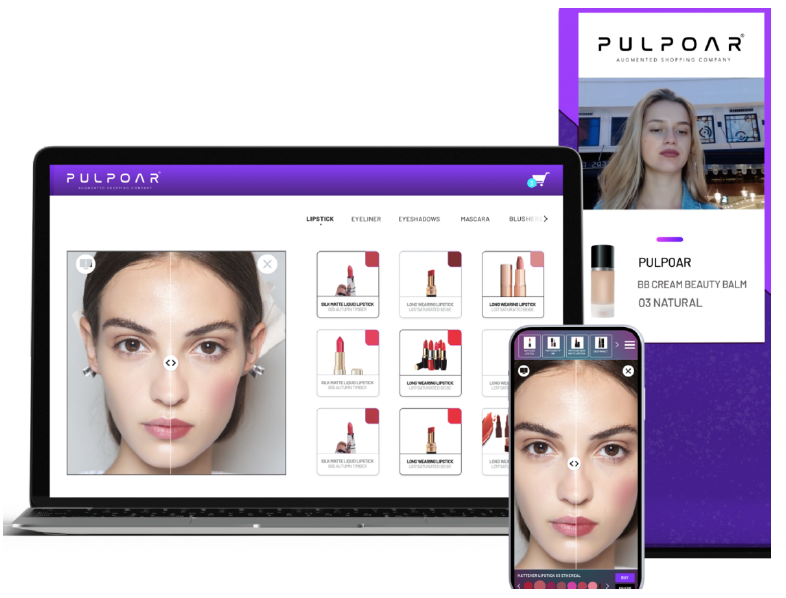
albert Chan
Metaverse Latest
Metaverse technologies and virtual gaming have surged in popularity during the Covid-19 pandemic and are continuing to evolve, grow and converge each month. Coresight Research has identified the expanding metaverse as a key trend to watch in global retail in 2022 and beyond.
Our Metaverse Latest series provides regular updates on metaverse developments, showing how key players and new entrants are seizing opportunities in the space. We also discuss three metaverse trends we have seen recently.
Recent Metaverse Developments
- On January 26, 2022, social media company Snap began offering catalogs through its augmented reality (AR) technology, Shopping Lenses, allowing customers to virtually sample, learn more about and purchase makeup, shoes, clothing and other accessories. According to the company, the new functionality facilitates real-time consumer analytics to help brands identify their most effective promotions.
- On February 1, 2022, France-based retailer Carrefour announced the purchase of a virtual plot of land in The Sandbox virtual gaming world to explore the evolution of retail.
- On February 4, 2022, UK-based fashion retailer PrettyLittleThing released a virtual model, “Virtual Girl,” to bridge the gap between the metaverse and real life. According to the company, the model sports the latest fashion pieces and will strive to provide users with immersive and progressive content.
- On February 7, 2022, Singapore-based blockchain company Gravitas International Associates announced its blockchain influencer marketing platform, Influencio Community. The platform provides brand owners and influencers with monetizing opportunities, and it is expanding to build a virtual environment.
- On February 7, 2022, German designer Philipp Plein announced that his organization, Swiss-based Plein Group, purchased a plot of virtual land in the Decentraland virtual world for $1.4 million. The company intends to develop a virtual art museum, luxury residences and a hotel on its plot, dubbed “Plein Plaza.”
- On February 8, 2022, blockchain-based auction house Portion purchased a plot of land in Decentraland for $1.2 million, overlooking Genesis Plaza (the heart of, and entry point to, the virtual world). The company hopes to connect brands and retailers with users through its metaverse presence; it has already partnered with well-known artists such as Wiz Khalifa and 2 Chainz to mint exclusive NFTs (non-fungible tokens).
- · On February 8, 2022, gaming titan Krafton unveiled artificial intelligence-based virtual human characters for its metaverse and gaming platform. The characters are set to appear as hyper-realistic game show hosts and virtual friends. Krafton is focused on making them as realistic as possible through its modeling and motion-capture technology.
- On February 9, 2022, consumer electronics retailer Samsung held its Galaxy Unpacked 2022 event for the Galaxy S22 release in its virtual store in Decentraland.
- On February 10, 2022, France-based cosmetics retailer L’Oréal filed for 17 trademarks related to virtual goods, including hair and body preparation products, and virtual perfume.
- On February 10, 2022, Chinese e-commerce giant Alibaba unveiled virtual avatar Dong Dong, a Beijing-native 22-year-old digital avatar, to promote the Winter Olympics by sharing trivia and debuting merchandise. Dong Dong was developed by Alibaba’s research arm, DAMO Academy.
- On February 10, 2022, Gucci announced a partnership with The Sandbox, through which users will be able to purchase NFTs of digital fashion pieces designed by Gucci through VoxEdit, The Sandbox’s in-game creator tool. Gucci’s virtual space will also feature an interactive environment based on the brand’s experimental online store, Vault.
- On February 10, 2022, Ethernity, the world’s first authenticated and licensed NFT platform and marketplace, raised $20 million for a technology lab to help investors, individuals and businesses mint authenticated NFTs and tokens. Ethernity has also partnered with The Sandbox to bring its licensed NFTs from brands and celebrities into the virtual game.
- On February 13, 2022, fashion giant Victoria’s Secret filed trademarks for NFT collectibles, digital clothing and media for use in blockchain and virtual worlds.
- On February 14, 2022, Animoca Brands (which owns The Sandbox) partnered with venture accelerator Brinc to create the Guild Accelator Program, which will invest up to $500,000 in each early-stage gaming guilds (gaming teams); this will be an investment in the play-to-earn market, enabling gamers to generate income.
- On February 15, 2022, JPMorgan became the first major bank to enter the metaverse when it announced that it had opened a lounge in Decentraland, called “Onyx,” to help its clients interact with the metaverse.
- On February 15, 2022, IZEA Worldwide, a provider of services for real-world influencer marketing, announced the launch of MetaMod, a specialized team that will leverage IZEA’s technologies, creator network and partnerships to sponsor collaborations between brands and influencers within virtual worlds.
- On February 15, 2022, youth retailer Pacsun announced its 2022 Spring/Summer campaign, featuring AR and VR (virtual reality) experiences, the launch of a video game, and influencer Emma Chamberlain as a digital avatar.
- On February 17, 2022, beverage company Coca-Cola unveiled a platform for providing customers with digital experiences along with limited-time flavors. Users will be able to test AR filters on social media, have immersive audio experiences and access AR concerts. The Real Magic campaign will also feature other immersive experiences and collaborations.
- On February 17, 2022, AR livestreaming app Beem announced that it had raised $4 million in seed funding as it builds a communication platform for AR spectacles. Beem has developed AR projects for notable brands such as Forever 21, H&M, Louis Vuitton and Warner Music.
- On February 18, 2022, UK-based apparel retailer Boohoo Group announced its collaboration with Paris Hilton’s “Paris World” in the Roblox game to launch a digital marketing campaign. The brand has secured in-world billboard space for advertisements during Roblox Fashion Week.
- On February 22, 2022, Animoca Brands announced a joint venture with Cube Entertainment, called AniCube, which will build a music-based metaverse and tokenize intellectual property. The collaboration will also bring Cube artists to The Sandbox.
Three Trends We’ve Seen Recently
1. The Virtual Land-Grabbing Craze Is Set To Continue
Although the metaverse is infinite in that there is no maximum number of environments that can exist, to create a functioning economy, blockchain-based cryptocurrency tokens and land supplies within each virtual world must be established to drive scarcity and demand. As metaverse gaming become more popular and more land is purchased, in-game assets and land tokens will skyrocket in value, meaning that entry costs will also surge.
Land parcels usually come with a basic set of pre-existing characteristics, but because developers are able to customize them to fit any specifications that they (or any avatar they want to create an experience for) desire, the opportunities for brands and retailers to monetize the virtual space are endless.
Like physical-world real estate, virtual real estate also varies in price based on location. Areas high in digital footfall will be pricier to purchase, lease and advertise in. As an example, in December 2021, an NFT collector purchased a $450,000 plot of land in one of The Sandbox’s most valuable spaces, Snoop Dogg’s Snoopverse. To investors, the chance to partner with brands and provide avatars from every corner of the globe with the same immersive experience is extremely valuable.
Virtual environments are offering investors the opportunity to purchase entire districts, as well as land within these districts, through NFTs, giving them the ability to create themed neighborhoods in high-traffic areas. Decentraland, for example, boasts a gambling district (Vegas City), a Chinese district (Dragon City), a fashion street in the shopping district, a music district (Festival Land) and many more.
Total virtual land sales in 2021 surpassed $500 million, and could double to $1 billion in 2022, according to metaverse data provider, MetaMetric Solutions.
Figure 1. Selected Major Virtual Land Purchases in The Sandbox and Decentraland Metaverse Environments
[caption id="attachment_142368" align="aligncenter" width="700"] Source: Company reports/Coresight Research [/caption]
Source: Company reports/Coresight Research [/caption]
2. Virtual Idols Are Popular Marketing Tools
Brands and businesses have been investing billions of dollars into influencer marketing, which is surging in popularity due to short-video apps such as Facebook, Instagram, TikTok and YouTube. Digital influencers can be computer-generated avatars created by companies for marketing or real-world influencers who establish their own avatars—two groups actually in competition with one another. Both are gaining share in the overall influencer market: There are currently more than 200 active virtual influencers, according to VirtualHumans.org.
Virtual influencers are already becoming as popular as regular influencers, with some of them set to earn staggering amounts this year (see Figure 2).
Figure 2. Selected Virtual Influencers in the Metaverse: Popularity and Projected Earnings
[caption id="attachment_142369" align="aligncenter" width="700"] Source: OnBuy.com[/caption]
Source: OnBuy.com[/caption]
In November 2021, Splash, a virtual environment developer within Roblox, raised $20.8 million in funding thanks in part to the popularity of one of its influencers. Kai is a computer-generated avatar controlled by a real person through immersive technologies. By day, Kai is one of Splash’s most active game developers; by night, she is a music producer, playing concerts for more than 100,000 avatars. She has become an inspiration for young players. Splash is now adding two additional influencers to form a “band,” giving it the ability to craft relationships and build narratives.
[caption id="attachment_142370" align="aligncenter" width="350"] Kai from Splash
Kai from SplashSource: Splash[/caption]
Along the same lines, in October 2021, luxury brand Prada introduced a virtual avatar, Candy, to appear in a variety of print and online advertisements as well as short films. Promoting a fragrance collection, the avatar sports Prada’s hottest items. The brand aims to use Candy to explore new virtual fronts and expand into different markets while maintaining control over its content and storyline. Prada can customize Candy’s looks, values and even personality to fit the product or changing consumer tastes.
Alibaba’s Dong Dong avatar (as we discussed earlier in this report) holds hours-long streaming sessions and has appeared in Alibaba’s streaming services to promote the Winter Olympics. China’s virtual idol market is set to reach a huge $42.4 billion by 2030, according to an industry report released by Chinese AI-service platform QbitAI.
Brands are also creating digital avatars for real-world humans. For example, luxury retailer Dior created a digital avatar of its ambassador Angelababy, who virtually attended a pre-fall collection show in Shanghai. Similarly, in November 2020, extended-reality entertainment platform Wave sponsored Justin Bieber’s virtual concert, where he interacted with fans on Wave and controlled his digital avatar through a full-body suit, allowing him to be more immersed in the virtual environment.
[caption id="attachment_142371" align="aligncenter" width="550"] Source: Wave[/caption]
Source: Wave[/caption]
3. Meta Beauty Is Being Driven by AR and VR Technologies
“Meta beauty” describes a broad field in which immersive technologies such as AR and VR are improving customizations for digital avatars and providing customers with real-world augmented overlays for experiential use. Rather than hosting a physical event, brands and retailers are beginning to launch collections of beauty products and accessories in virtual spaces to build an immersive experience that is accessible to a larger base of customers, with tools to sample products.
One startup capitalizing on the meta beauty trend is PulpoAR, which utilizes AR technology to allow customers of some of the world’s largest retailers to sample makeup products virtually. It offers facial detection through 3D facial-tracking technologies, as well as nail, skin and hair segmentation via machine learning and a color-changing algorithm for color sampling. For businesses, PulpoAR offers a data studio for real-time analytics as well as a smart mirror, to enable customers to use its service in-store. The service is also accessible via social media, desktop and mobile.
[caption id="attachment_142372" align="aligncenter" width="550"] Source: PulpoAR[/caption]
Source: PulpoAR[/caption]
Snap has been experimenting with AR technologies for years, and its Shopping Lenses saw over 6 billion interactions per day in 2020, according to the company. As we stated earlier, Snap recently began offering virtual catalogs through Shopping Lenses, allowing users to sample products. Ulta Beauty has capitalized on this opportunity, with the catalog-powered Shopping Lenses having brought in $6 million in incremental sales, according to Snap Ads Manager, as of December 2021.
AR technologies provide experiential tools as an extension of the physical world, while VR technologies are important for digital avatars in the beauty space. South Korean virtual environment Zepeto, for example, recently partnered with French cosmetics retailer Nars to offer several virtual makeup looks for its digital avatars. The company has also partnered with Dior’s creative image director to design avatars with unique makeup stylings. As the metaverse gains traction, accessorizing digital avatars will be a significant factor for brands in building their virtual-world reputation.
[caption id="attachment_142373" align="aligncenter" width="350"] Dior’s Zepeto model
Dior’s Zepeto modelSource: Zepeto[/caption]
What We Think
The metaverse continues to evolve as it becomes more established. Virtual land sales are hitting staggering amounts, and are only going to rise in 2022, making it costlier for brands to get involved due to fixed token and land supply in blockchain-based virtual worlds. Blockchain worlds with rapidly growing user bases will also become increasingly more expensive to monetize.
Retailers who are already involved in the metaverse are seeing major success with virtual influencers and digital avatars promoting their products and offerings. By utilizing virtual idols, retailers can control their brand narrative and adjust idol features to fit changing narratives, values and customer tastes. Partnering with real-world influencers allows retailers to attract customers to their virtual experiences, with headset and sensory technology allowing for closer levels of interaction.
The technologies that enable powerful 3D displays and virtual interaction with influencers, such as AR and VR, are also helping power an emerging era of meta beauty, where customers have access to powerfully accurate experiential tools not available with traditional online shopping. Retailers could offer these tools to customers from every corner of the globe, improving customer experience for all. As customers will likely become more invested into their digital lives, meta beauty also encompasses beauty and accessories for avatars, which will become important as avatars become fashion and status symbols.